A multimeter, also known as a volt-ohm meter, or a multitester, is an electronic measurement instrument used to measure several electrical values. A typical multimeter can be used to measure voltage, current and resistance. Some of the best multimeter can do more than that, let us share some tips with you.
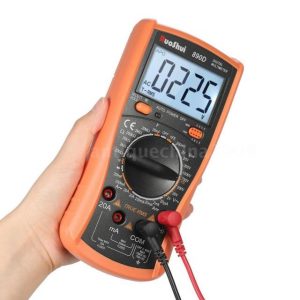
Before purchasing a multimeter, you should understand the basic types, their features, and the common uses.
Multimeters come in either the smaller handheld type or the larger bench-mount version. Although the latter is a more accurate tool, the handheld models would be more practical.
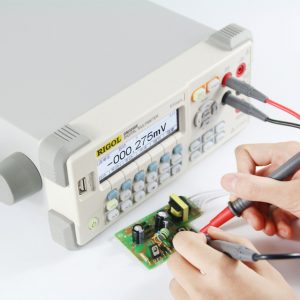
The following is a guide that gives you a basic overview of the types of multimeters available and how to select a multimeter that best fits your needs.
How Are You Going to Use the Multimeter?
Knowing what you intend to use the multimeter for is the first consideration when choosing the best multimeter for you. This makes it easier to to narrow down the selection process.
If you are buying it for personal use around the house, a multimeter with basic functions will suffice. On the other hand, you will most likely want a more sophisticated model if you are a contractor.
However, if you plan to use the multimeter extensively, even if it is for personal use, it’s best to get a multimeter of good quality. To identify good quality models of multimeters, you may check the reviews of the particular model.
What is the Best Multimeter for Your Price Range?
If you are using the multimeter for personal purposes, the least expensive multimeter will be sufficient to meet your needs. A word of caution here, you get what you pay for. A cheaper unit will have its limitations.
Price is usually an indication of quality. Therefore, if you are looking to use the multimeter professionally in the long run, you shouldn’t compromise quality for price. A multimeter priced between $200-$300 would be a good investment.
Also, keep in mind that multimeters needs calibration on a regular basis to maintain accuracy and prevent error in readings. Calibration costs can range between $50-$100 for a handheld multimeter. If you are under a tight budget, you can opt for a cheaper multimeter that does not require calibration. However, this would mean that replacement is needed once the multimeter is damaged or is no longer accurate.
Type of Multimeters
Multimeters fall into two basic categories, digital and analog. While both types of multimeters function as great tools, the most suitable type of multimeter would depend on what you plan to use it for.
Digital Multimeter
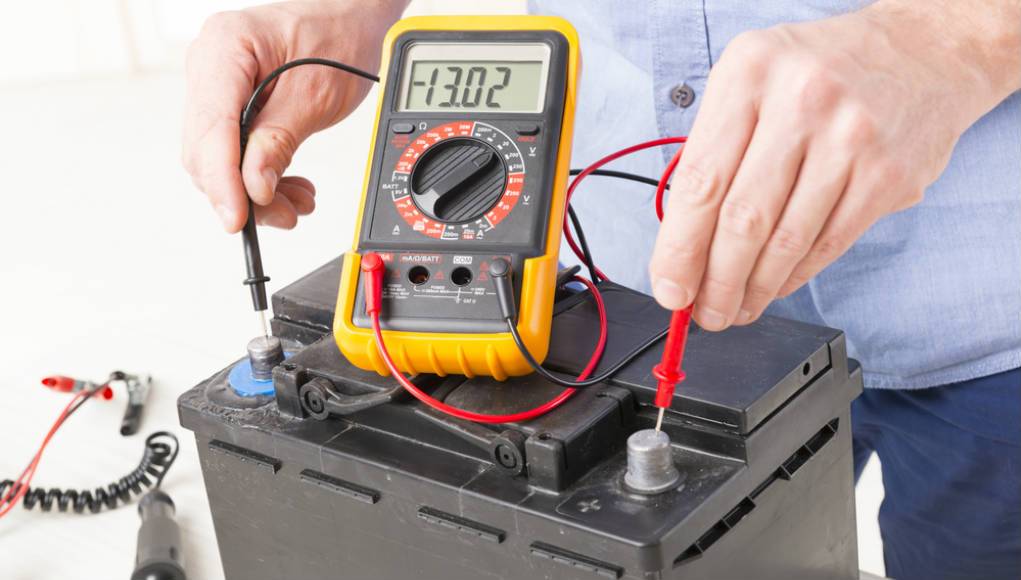
Electrical technicians usually opt for Digital Multimeter (DMM) to measure current, voltage, and resistance. Digital meters are more accurate and reliable than their analog predecessors.
They also have a wide variety of additional features. For instance, a digital meter can test for voltage and resistance at the same time. Most digital multimeters are able to test temperature while some can even measure power levels.
A digital meter is the best multimeter for technicians, who would need such advanced features to do their work with accuracy and precision.
Physical Features
A digital meter has four physical components:
- Display screen
In contrast with the analog multimeter’s needle scale which can fluctuate and is difficult to read, the digital multimeter’s LCD screen shows results accurately. With results shown in decimal format, the digital multimeter removes any guesswork of the results.
- Function buttons
This is used to select different options and functions to operate the multimeter.
- Input jacks
The fourth component is the input jacks. The test leads, which are insulated wires, are inserted into the jacks. The wires conduct electricity from the test object to the meter. Red is positive while black is negative.
- Rotary dial/rotary switch
The dial allows you to choose your measurement unit, either in ohms (resistance), amps (current), or volts (voltage).
Auto-Range Feature
Higher-end DMMs have an auto-range feature. With this function, the meter automatically detects the level of measurement (ohms, for example) and selects the required range for you.
Resolution
Resolution for a multimeter determines its level of sensitivity. Knowing the meter’s resolution is important as it allows the user to determine how small a change the meter can detect in the electrical signal. This can help with getting an accurate and precise reading.
Analog Multimeter
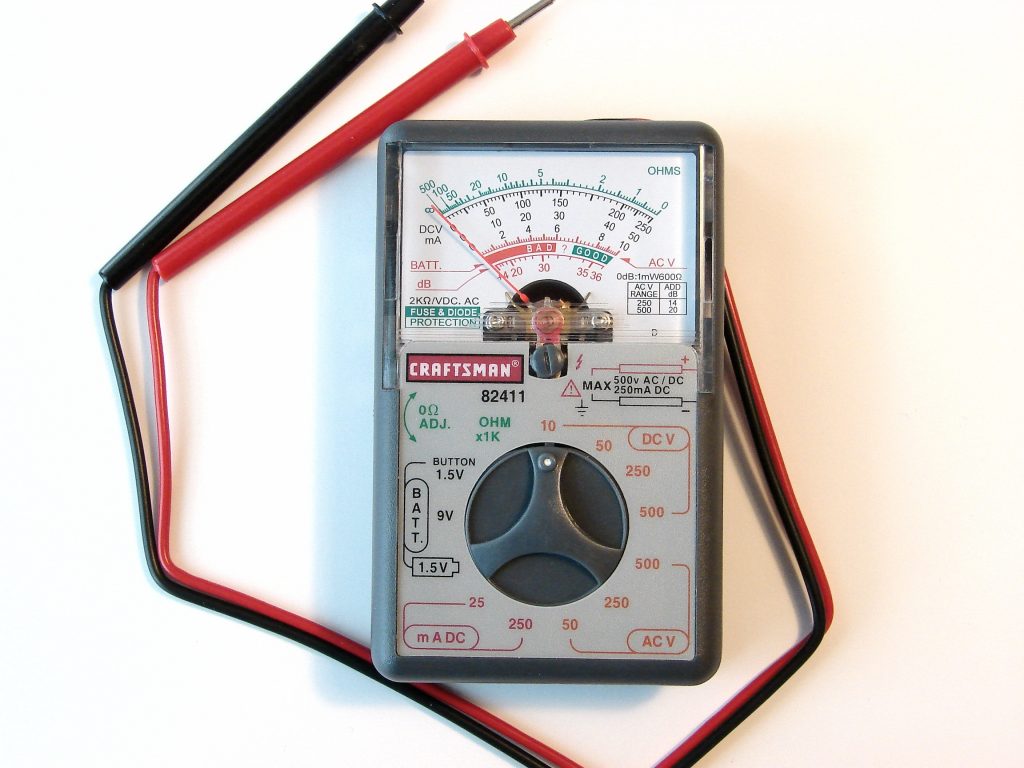
While digital multimeters now dominate the market, analog meters are still around because they prove to be a great, less expensive alternative to the digital multimeter.
Advantages
They show results more quickly than their digital counterparts. This makes it advantageous for technicians to quickly record readings and get work done. This is because they often need to check the continuity of several wires at any given time. Therefore, the use of analog multimeters will be more efficient.
The same applies when checking transitory voltage. The analog needle readout of the VOM makes it easier to see trends in the current. As current can fluctuate suddenly, analog multimeters are better at accurately showing sudden movements of current. Such readings will alert the user of any potential problems with the electricity flow.
Another characteristic of analog meters is that they are not as fragile as their digital counterparts. LED components can break easily and can be extremely sensitive once damage is done. In this case, analog meters are more durable and long-lasting.
Disadvantages
On the other hand, an analog operate using a needle and coil. This makes them sensitive to shocks and vibrations. Therefore, this can cause damage in the long run.
Finally, analog displays are harder to read because they show different scales with different values on the face. If you aren’t familiar with how to read these values, you will have difficulty using an analog meter.
Furthermore, an analog meter does not show decimals, making it difficult to read below-zero readings or getting precise values.
Choose Your Features
Once you have decided on a type of multimeter which best suits your needs, you then need to decide which features of a multimeter you should look out for. Such features include functionality, quality, accuracy, and calibration.
Measurement Functions
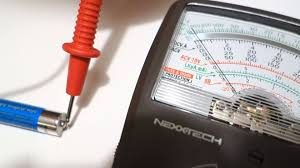 The more measurement functions the multimeter has, the more expensive it is. Getting such a multimeter may be costly but its versatility makes it a good investment.
The more measurement functions the multimeter has, the more expensive it is. Getting such a multimeter may be costly but its versatility makes it a good investment.
You should also consider whether you want a multimeter that is able to read measurements beyond the basic volts, amps, and ohms. Additional measurements you may need include capacitance measurement, temperature measurement, diode testing, and frequency counting. Other common unit measurements include transistor and frequency measurements.
Different models of digital multimeters have varying functions and specifications. Take some time to weigh your options and decide which measurement functions is most important to you.
Quality
To determine the quality of a multimeter, consider how durable, accurate and long-lasting it is.
If you are looking for quality multimeters, find those with probes that are insulated with a safer material such as silicone. Low quality multimeters are usually made of PVC material instead. The body of the multimeter should be sturdy and solid while the dial should be easy to turn.
Safety
 When looking to buy a multimeter of any kind, be sure to check the safety ratings for each model. This is especially important if you will be working with circuits above 30V. Safety ratings consider the voltage of the equipment you will be testing. It also rates the unit’s resilience to peak transients on the lines.
When looking to buy a multimeter of any kind, be sure to check the safety ratings for each model. This is especially important if you will be working with circuits above 30V. Safety ratings consider the voltage of the equipment you will be testing. It also rates the unit’s resilience to peak transients on the lines.
Besides the safety rating, you should also evaluate if the multimeter is physically safe to use. To determine this, take a look at the design of the multimeter. A safety-assured multimeter will have features like internal blast shield. The banana plugs on the probes will also be shrouded for maximum protection.
Next, look for flanges on the probes that will keep your fingers from slipping past the probe’s insulation. The unit should have isolation slots, which go into the multimeter’s PCB. This prevents arc-over.
If you are not experienced in this field, then you should take extra precaution and ensure that the multimeter you are getting is certified to be safe for use.
Accuracy
Accuracy wouldn’t be a critical issue if you are simply checking if a circuit is working or not. However, if you need more precision from your meter for accurate readings and measurement, then you will want to spend a little more for a better quality meter.
Remember that resolution is related to accuracy. How sensitive the meter is to currents flowing through it will determine its accuracy in readings. You’ll want to consider both when choosing a digital multimeter.
Calibration
If you are going for a high-accuracy meter, then take the next step and be sure your meter is calibratable. As mentioned before, all multimeters need to be calibrated eventually to maintain its usability.
If yours isn’t calibratable, then you will have to purchase a new one once your current multimeter is spoilt or damaged.
Best Multimeter Brands to Look For
There are several reputable brands that manufacture the best multimeters. Fluke, a leading brand in electronic test tools, has the reputation of being one of the best.
Since 1977, Fluke is a leader in electrical troubleshooting equipment. This includes cable testers and calibration equipment. They are especially well-known for their strong line of handheld digital multimeters.
Other notable brands of quality handheld digital multimeters include Brymen and Lutron.
Finally, Hioki and Kyoritsu have multimeters at affordable prices which is good for those under a tight buget.
If you are looking for a benchtop multimeter, Agilent is an industry standard in this field.
Where to Buy Multimeter Online
Multimeters are available on any number of websites. For personal use, you can check out Amazon and eBay. These retailers would have a wide selection of tools for you to choose from that would meet your needs.
If you are a technician or in charge of procuring equipment for your company, there are also B2B ecommerce like ours available to help you purchase your equipment at a competitive prices conveniently.
Make Your Choice
To find the best multimeter that will suit your needs, it is important to identify what are the factors or considerations that are most important for you. You would also need to know what you want to use them for.
Next, you would have to then weigh your options and identify the most suitable multimeters.
Check out our recent review on the Brymen MB869s multimeter. If you own a Brymen multimeter be sure to let us know what you think of it.
If you have any questions about purchasing multimeters or other equipment, please contact us. We would be more than happy to help.
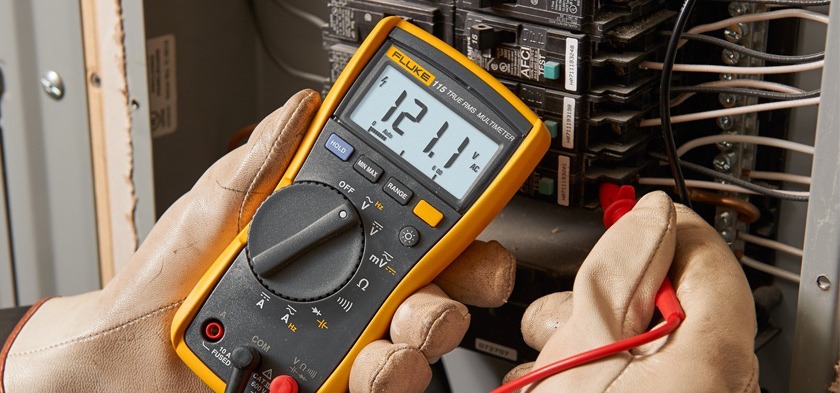
Stay connected